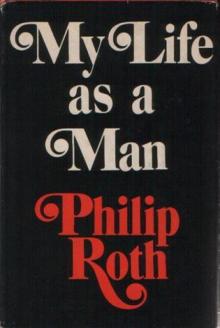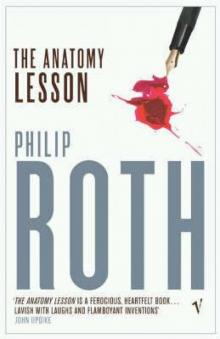- Home
- Philip Roth
American Pastoral Page 3
American Pastoral Read online
Page 3
my hand again to his father. “Nice to see you, Swede.”
“You bet. Take it easy, Skip.”
· 16 ·
“Remember me to your brother,” I said.
He laughed, we parted, and someone was saying to me, “Well, well, the greatest
athlete in the history of Weequahic High called you’Skip.’”
“I know. I can’t believe it.” And I did feel almost as wonderfully singled out
as I had the one time before, at the age often, when the Swede had got so
personal as to recognize me by the playground nickname I’d acquired because of
two grades I skipped in grade school.
Midway through the first inning, the woman with us turned to me and said, “You
should have seen your face—you might as well have told us he was Zeus. I saw
just what you looked like as a boy.”
The following letter reached me by way of my publisher a couple of weeks before
Memorial Day, 1995.
Dear Skip Zuckerman:
I apologize for any inconvenience this letter may cause you. You may not
remember our meeting at Shea Stadium. I was with my oldest son (now a first-year
college student) and you were out with some friends to see the Mets. That was
ten years ago, the era of Carter-Gooden-Hernandez, when you could still watch
the Mets. You can’t anymore.
I am writing to ask if we might meet sometime to talk. I’d be delighted to take
you to dinner in New York if you would permit me.
* * *
I’m taking the liberty of proposing a meeting because of something I have been
thinking about since my father died last year. He was ninety-six. He was his
feisty, combative self right down to the end. That made it all the harder to see
him go, despite his advanced age.
I would like to talk about him and his life. I have been trying to write a
tribute to him, to be published privately for friends, family, and business
associates. Most everybody thought of my father as indestructible, a thick-
skinned man on a short fuse. That was far from the truth. Not everyone
knew how much he suffered because of the shocks that befell his loved ones.
Please be assured that I will understand if you haven’t time to respond.
Sincerely,
Seymour “Swede” Levov, WHS 1945
Had anyone else asked if he could talk to me about a tribute he was writing to
his father, I would have wished him luck and kept my nose out of it. But there
were compelling reasons for my getting off a note to the Swede—within the hour—
to say that I was at his disposal. The first was Swede Levov wants to meet me.
Ridiculously, perhaps, at the onset of old age, I had only to see his signature
at the foot of the letter to be swamped by memories of him, both on and off the
field, that were some fifty years old and yet still captivating. I remembered
going up every day to the playing field to watch football practice the year that
the Swede first agreed to join the team. He was already a high-scoring hook-shot
artist on the basketball court, but no one knew he could be just as magical on
the football field until the coach pressed him into duty as an end and our
losing team, though still at the bottom of the city league, was putting up one,
two, even three touchdowns a game, all scored on passes to the Swede. Fifty or
sixty kids gathered along the sidelines at practice to watch the Swede—in a
battered leather helmet and the brown jersey numbered, in orange, 11—working out
with the varsity against the JVs. The varsity quarterback, Lefty Leventhal, ran
pass play after pass play (“Lev-en- thai to Le-vov.’ Lev-en-thal to Le-vov.’”
was an anapest that could always get us going back in the heyday of the Swede),
and the task of the JV squad, playing defense, was to stop Swede Levov from
scoring every time. I’m over sixty, not exactly someone with the outlook on life
that he’d had as a boy, and yet the boy’s beguilement has never wholly
evaporated, for to this day I haven’t forgotten the Swede, after being smothered
by tacklers, climbing slowly to his feet, shaking himself off, casting an
upward, remonstrative glance at the darkening fall sky, sighing rue-
18
fully, and then trotting undamaged back to the huddle. When he scored, that was
one kind of glory, and when he got tackled and piled on hard, and just stood up
and shook it off, that was another kind of glory, even in a scrimmage.
And then one day I shared in that glory. I was ten, never before touched by
greatness, and would have been as beneath the Swede’s attention as anyone else
along the sidelines had it not been for Jerry Levov. Jerry had recently taken me
on board as a friend; though I was hard put to believe it, the Swede must have
noticed me around their house. And so late on a fall afternoon in 1943, when he
got slammed to the ground by the whole of the JV team after catching a short
Leventhal bullet and the coach abruptly blew the whistle signaling that was it
for the day, the Swede, tentatively flexing an elbow while half running and half
limping off the field, spotted me among the other kids, and called over,
“Basketball was never like this, Skip.”
* * *
The god (himself all of sixteen) had carried me up into athletes’ heaven. The
adored had acknowledged the adoring. Of course, with athletes as with movie
idols, each worshiper imagines that he or she has a secret, personal link, but
this was one forged openly by the most unostentatious of stars and before a
hushed congregation of competitive kids—an amazing experience, and I was
thrilled. I blushed, I was thrilled, I probably thought of nothing else for the
rest of the week. The mock jock self-pity, the manly generosity, the princely
graciousness, the athlete’s self-pleasure so abundant that a portion can be
freely given to the crowd—this munificence not only overwhelmed me and wafted
through me because it had come wrapped in my nickname but became fixed in my
mind as an embodiment of something grander even than his talent for sports: the
talent for “being himself,” the capacity to be this strange engulfing force and
yet to have a voice and a smile unsullied by even a flicker of superiority—the
natural modesty of someone for whom there were no obstacles, who appeared never
to have to struggle to clear a space for himself. I don’t imagine I’m the only
grown man who was a Jewish kid aspiring to be an all-American kid during
the patriotic war years—when our entire neighborhood’s wartime hope seemed to
converge in the marvelous body of the Swede— who’s carried with him through life
recollections of this gifted boy’s unsurpassable style.
The Jewishness that he wore so lightly as one of the tall, blond athletic
winners must have spoken to us too—in our idolizing the Swede and his
unconscious oneness with America, I suppose there was a tinge of shame and self-
rejection. Conflicting Jewish desires awakened by the sight of him were
simultaneously becalmed by him; the contradiction in Jews who want to fit in and
want to stand out, who insist they are different and insist they are no
different, resolved itself in the triumphant spectacle of this Swede who was
actually only an
other of our neighborhood Seymours whose forebears had been
Solomons and Sauls and who would themselves beget Stephens who would in turn
beget Shawns. Where was the Jew in him? You couldn’t find it and yet you knew it
was there. Where was the irrationality in him? Where was the crybaby in him?
Where were the wayward temptations? No guile. No artifice. No mischief. All that
he had eliminated to achieve his perfection. No striving, no ambivalence, no
doubleness—just the style, the natural physical refinement of a star.
Only … what did he do for subjectivity? What was the Swede’s subjectivity?
There had to be a substratum, but its composition was unimaginable.
That was the second reason I answered his letter—the substratum. What sort of
mental existence had been his? What, if anything, had ever threatened to
destabilize the Swede’s trajectory? No one gets through unmarked by brooding,
grief, confusion, and loss. Even those who had it all as kids sooner or later
get the average share of misery, if not sometimes more. There had to have been
consciousness and there had to have been blight. Yet I could not picture the
form taken by either, could not desimplify him even now: in the residuum of
adolescent imagination I was still convinced that for the Swede it had to have
been pain-free all the way.
But what had he been alluding to in that careful, courteous letter
20
when, speaking of the late father, a man not as thick-skinned as people thought,
he wrote, “Not everyone knew how much he suffered because of the shocks that
befell his loved ones”? No, the Swede had suffered a shock. And it was suffering
the shock that he wanted to talk about. It wasn’t the father’s life, it was his
own that he wanted revealed.
* * *
I was wrong.
We met at an Italian restaurant in the West Forties where the Swede had for
years been taking his family whenever they came over to New York for a Broadway
show or to watch the Knicks at the Garden, and I understood right off that I
wasn’t going to get anywhere near the substratum. Everybody at Vincent’s knew
him by name—Vincent himself, Vincent’s wife, Louie the maitre d’, Carlo the
bartender, Billy our waiter, everybody knew Mr. Levov and everybody asked after
the missus and the boys. It turned out that when his parents were alive he used
to bring them to celebrate an anniversary or a birthday at Vincent’s. No, I
thought, he’s invited me here to reveal only that he is as admired on West 49th
Street as he was on Chancellor Avenue.
Vincent’s is one of those oldish Italian restaurants tucked into the midtown
West Side streets between Madison Square Garden and the Plaza, small restaurants
three tables wide and four chandeliers deep, with decor and menus that have
changed hardly at all since before arugula was discovered. There was a ballgame
on the TV set by the small bar, and a customer every once in a while would get
up, go look for a minute, ask the bartender the score, ask how Mattingly was
doing, and head back to his meal. The chairs were upholstered in electric-
turquoise plastic, the floor was tiled in speckled salmon, one wall was
mirrored, the chandeliers were fake brass, and for decoration there was a five-
foot-tall bright red pepper grinder standing in one corner like a Giacometti (a
gift, said the Swede, to Vincent from his hometown in Italy); counterbalancing
it in the opposite corner, on a stand like statuary, stood a stout Jeroboam of
Barolo. A table piled with jars of Vincent’s Marinara
21
Sauce was just across from the bowl of free after-dinner mints beside Mrs.
Vincent’s register; on the dessert cart was the napoleon, the tiramisu, the
layer cake, the apple tart, and the sugared strawberries; and behind our table,
on the wall, were the autographed photographs (“Best regards to Vincent and
Anne”) of Sammy Davis, Jr., Joe Namath, Liza Minelli, Kaye Ballard, Gene Kelly,
Jack Carter, Phil Rizzuto, and Johnny and Joanna Carson. There should have been
one of the Swede, of course, and there would have been if we were still fighting
the Germans and the Japanese and across the street were Weequahic High.
Our waiter, Billy, a small, heavyset bald man with a boxer’s flattened nose,
didn’t have to ask what the Swede wanted to eat. For over thirty years the Swede
had been ordering from Billy the house specialty, ziti a la Vincent, preceded by
clams posillipo. “Best baked ziti in New York,” the Swede told me, but I ordered
my own old-fashioned favorite, the chicken cacciatore, “off the bone” at Billy’s
suggestion. While writing up our order, Billy told the Swede that Tony Bennett
had been in the evening before. For a man with Billy’s compact build, a man you
might have imagined lugging around a weightier burden all his life than a plate
of ziti, Billy’s voice—high-pitched and intense, taut from some distress too
long endured—was unexpected and a real treat. “See where your friend is sitting?
See his chair, Mr. Levov? Tony Bennett sat in that chair.” To me he said, “You
know what Tony Bennett says when people come up to his table and introduce
themselves to him? He says, ‘Nice to see you.’ And you’re in his seat.”
That ended the entertainment. It was work from there on out.
He had brought photographs of his three boys to show me, and from the appetizer
through to dessert virtually all conversation was about eighteen-year-old Chris,
sixteen-year-old Steve, and fourteen-year-old Kent. Which boy was better at
lacrosse than at baseball but was being pressured by a coach … which was as
good at soccer as at football but couldn’t decide … which was the diving
champion who had also broken school records in butterfly and
* * *
22
backstroke. All three were hardworking students, A’s and B’s; one was “into” the
sciences, another was more “community-minded,” while the third … etc. There
was one photograph of the boys with their mother, a good-looking fortyish
blonde, advertising manager for a Morris County weekly. But she hadn’t begun her
career, the Swede was quick to add, until their youngest had entered second
grade. The boys were lucky to have a mom who still put staying at home and
raising kids ahead of…
I was impressed, as the meal wore on, by how assured he seemed of everything
commonplace he said, and how everything he said was suffused by his good nature.
I kept waiting for him to lay bare something more than this pointed
unobjectionableness, but all that rose to the surface was more surface. What he
has instead of a being, I thought, is blandness—the guy’s radiant with it. He
has devised for himself an incognito, and the incognito has become him. Several
times during the meal I didn’t think I was going to make it, didn’t think I’d
get to dessert if he was going to keep praising his family and praising his
family … until I began to wonder if it wasn’t that he was incognito but that
he was mad.
Something was on top of him that had called a halt to him. Something had turned
him into a human platitude. Something had warned him: You must not run counter
to anything.
The Swede, some six or seven years my senior, was close to seventy, and yet he
was no less splendid-looking for the crevices at the corners of his eyes and,
beneath the promontory of cheekbones, a little more hollowing out than classic
standards of ruggedness required. I chalked up the gauntness to a regimen of
serious jogging or tennis, until near the end of the meal I found out that he’d
had prostate surgery during the winter and was only beginning to regain the
weight he’d lost. I don’t know if it was learning that he’d suffered an
affliction or his confessing to one that most surprised me. I even wondered if
it might not be his recent experience of the surgery and its aftereffects that
was feeding my sense of someone who was not mentally sound.
At one point I interrupted and, trying not to appear in any way
desperate, asked about the business, what it was like these days running a
factory in Newark. That’s how I discovered that Newark Maid hadn’t been in
Newark since the early seventies. Virtually the whole industry had moved
offshore: the unions had made it more and more difficult for a manufacturer to
make any money, you could hardly find people to do that kind of piecework
anymore, or to do it the way you wanted it done, and elsewhere there was an
availability of workers who could be trained nearly to the standards that had
obtained in the glove industry forty and fifty years ago. His family had kept
their operation going in Newark for quite a long time; out of duty to long-
standing employees, most of whom were black, the Swede had hung on for some six

 American Pastoral
American Pastoral The plot against America
The plot against America The Human Stain
The Human Stain Nemesis n-4
Nemesis n-4 Sabbath’s Theater
Sabbath’s Theater The Professor of Desire
The Professor of Desire Our Gang
Our Gang The Breast
The Breast Operation Shylock
Operation Shylock The Dying Animal
The Dying Animal Letting Go
Letting Go The Counterlife
The Counterlife Everyman
Everyman Nemesis
Nemesis Exit Ghost
Exit Ghost Portnoy's Complaint
Portnoy's Complaint My Life as a Man
My Life as a Man I Married a Communist
I Married a Communist The Anatomy Lesson
The Anatomy Lesson The Great American Novel
The Great American Novel Shop Talk
Shop Talk The Humbling
The Humbling Zuckerman Unbound
Zuckerman Unbound When She Was Good
When She Was Good The Prague Orgy
The Prague Orgy American Pastoral (Nathan Zuckerman)
American Pastoral (Nathan Zuckerman) Goodbye, Columbus
Goodbye, Columbus Reading Myself and Others
Reading Myself and Others